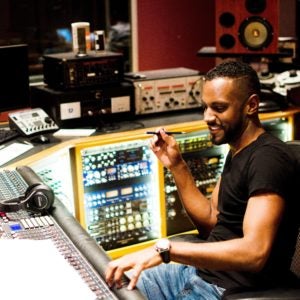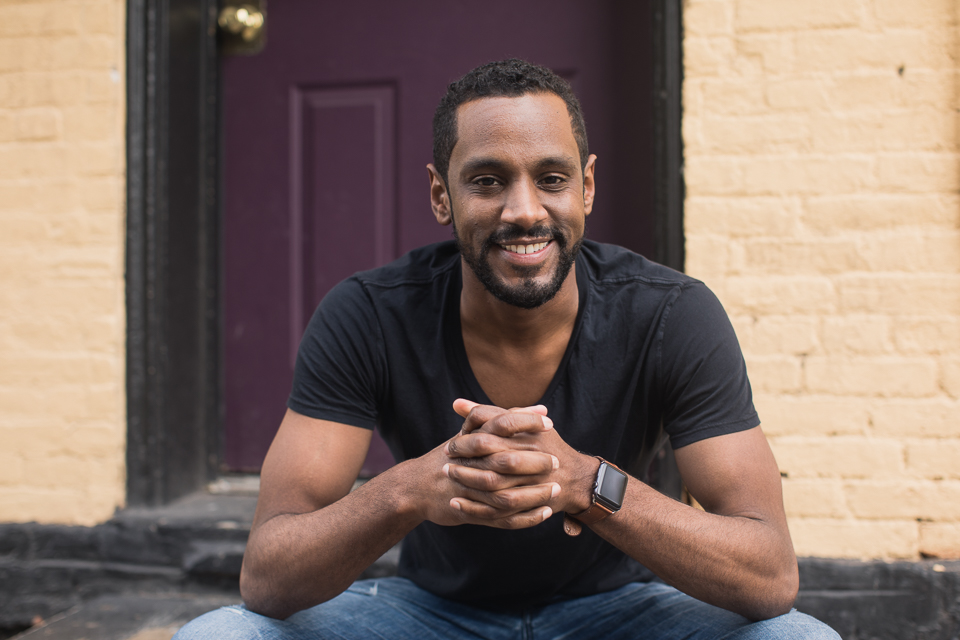Performing Arts Welcomes Newest Faculty Member, Award-Winning Composer Carlos Simon
Carlos Simon, award-winning composer and musician, was welcomed to the Department of Performing Arts this past fall as a new member to their staff. Since starting his position, Simon has already brought his talents to the numerous projects he has become involved in at Georgetown, including a new composition dedicated to the slaves that helped build the university.
A Lifelong Passion
Simon grew up in Atlanta, Georgia where he started to play the organ at the age of 12 in his father’s church. He fondly remembers spending holidays with his extended family, learning about the intricacies of notes and melody for hours.
“That’s where my interest in music was born and I decided to keep pursuing it through high school and into college,” says Simon. “I noticed that there is something that music can say that words cannot and I wanted to continue exploring that medium.”
After graduating with a M.A. from both Georgia State and New York University, Simon studied at the University of Michigan where he earned a doctorate in musical arts. Now, he writes concert music and award-winning film scores that showcase his early musical influences of jazz, gospel and neo-romanticism. Simon said that he loves working in classical music because it allows him to try new things in composition.
“Classical music gives me so much freedom to experiment,” says Simon. “You don’t have to follow the rules in the same way as in other mediums like jazz. I can play with almost an endless number of sound combinations that don’t exist anywhere else, and this allows me to say what I want to say in music.”
And Simon’s music is always saying something.
Social Justice Mindset
Before he begins to work on a piece, Simon makes sure that it will incorporate his other passion: social justice. Simon is drawn to projects that are mission-driven, whether he is creating a new score for a film or writing a new concert piece.

Carlos Simon in Studio
“In order for me to write something worth listening to, I need to feel connected to the project I am joining,” says Simon. “The projects I have been drawn to have always been about telling the stories of people who aren’t often heard or are misrepresented or marginalized.”
In his short time at Georgetown, Simon has quickly become involved in several of the social activist organizations on campus, including the Slavery, Memory and Reconciliation Project, an initiative that was created in response to the discovery that Jesuits at Georgetown sold 272 slaves in the fall of 1838 to alleviate debts owed by the university.
Since becoming involved in the initiative, Simon began working on a piece to commemorate these slaves. He recently visited the plantations to which many of the slaves were sold in Louisiana in order to gain a deeper understanding of what their lives might have been like.
“It’s important for me to understand as much as I can about the subjects I am working on to give them the dignity and justice they deserve,” says Simon. “When I was in Louisiana, there were acres and acres of agricultural fields where the slaves worked. Visiting this place really gave me a sense, that I would not otherwise have gotten, about the pain and suffering these individuals must have faced. Now when I write this piece, I will be able to represent them better than I would have before.”
This piece is one of many that he has written for others. His latest concert piece, Elegy, was performed by his quartet at the Kennedy Center in Washington, D.C., that honored the lives of Trayvon Martin, Michael Brown and Eric Garner, who were the victims of police brutality.
Other Work at Georgetown
In addition to this project, Simon is partnering with Georgetown artist-in-residence Marco Pavé to create new, cross-genre music. He is also teaching two courses: Advanced Harmony and Music and Sound for Film.
Simon says that during his time at the university, he has already learned a great deal more about music.
“The students have taught me so much and I’ve learned to continue to be open-minded,” says Simon. “For example, I’ll ask them what they are listening to expecting one response, but I’ll get anything from Tchaikovsky’s symphony to the Beatles.”
The students feel the same way about Simon. Anna Celenza, the Thomas E. Caestecker Professor of Music in the performing arts department, noted that his classes are very popular, and that in the space of a single year, he has already become a mentor to several of Georgetown’s music students, inspiring students to find their own voices as composers.
“I really realized how much of a role model Carlos is to our students during this past week, when we were all trying to get our footing amidst the move to the virtual classroom in response to COVID-19,” says Celenza. “In a writing class, I suggested that students write a letter to someone they were now separated from, but wanted to keep in touch with. Most students said they would write to a grandparent or a college friend, but one student said he would write to Carlos Simon.”
A Lasting Impact
Celenza also noted that Simon was a truly incredible composer.
“Carlos is one of the best in his generation. When I heard the premiere of his latest opera at the Kennedy Center this fall, it blew me away.”
In his short career, Simon has already achieved several noteworthy accolades. The ASCAP (American Society of Composers, Authors and Publishers) called him one of the “Composers to Watch” in 2015, and in 2018 Simon was named a Sundance/Time Warner Composer Fellow as part of the Sundance Institute.
The composer’s latest album My Ancestor’s Gift was released in April of 2018, and was featured in Apple Music’s “Albums to Watch.”
Simon has had recent commissions from orchestras like the Philadelphia Orchestra, Washington National Opera, Reno Philharmonic, the American Composers Orchestra, and Arizona State University Symphony Orchestra. He was sought after for the Irving Klein String Competition, Morehouse College, the University of Michigan Symphony Band and Albany Symphony’s Dogs of Desire, as well as serving as the young composer-in-residence with the Detroit Chamber String and Winds in 2016.
But the project that Simon was most excited about was being able to participate in the Cabrillo Festival for Contemporary Music in 2016. While there, Simon had the unique opportunity to work with the same musicians that worked under composers like John Williams or Hans Zimmer to try their hand at a “new score” for an existing film.
At the end of the experience, Simon won the Underwood Emerging Composer Commission. This reinforced his passion for music and his belief of the impact that it can have in society. Simon says that he wants to leave his mark, but does enjoy retaining his sense of individuality.
“I like being a composer because you get to contribute something and leave your lasting mark, but it doesn’t become your life – I can still go to the grocery store and not get swamped by people,” says Simon. “I doubt most people know who John Williams is, but he has had an indelible impact with scores for movies like Jaws, Stars, Wars, Jurassic Park, and Indiana Jones. My hope is that my music will make as big of a difference.”
- Tagged
- Faculty
- Performing Arts
